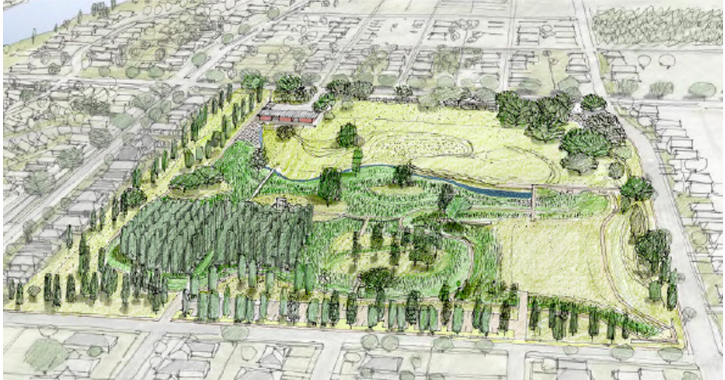Loyola Academy to bring conservation knowledge to Mirabeau Gardens in Gentilly
The city was granted 25 acres of green space in Gentilly to create the Mirabeau Water Garden, which is set to open in the summer of 2020. The gardens were created to educate the public on water conservation and other eco-friendly practices. Courtesy city of New Orleans.
November 17, 2019
In the heart of Gentilly, 25 acres of Federal Emergency Management Agency-funded space was recently granted to build Mirabeau Water Gardens, a place where water conservation will be modeled on a larger-scale.
For Loyola professors Aimée Thomas and Bob Thomas, this was a dream ten years in the making.
The idea for the grant stemmed from Loyola’s relationship with the Sisters of Saint Joseph, who donated the space to the city when they left it after Hurricane Katrina.
“They actually wanted Loyola to take over the property once they deemed that they weren’t going to be there anymore to use it for environmental education,” Director of the Environment Program Aimée Thomas said.
Since Loyola didn’t have the resources to manage the land, the grant was issued to the city of New Orleans and funded by the university, Entergy Corporation, AT&T and Waggonner & Ball Architects.
Loyola has helped provide the education piece of the project, which they call the “Loyola Academy.”
“The vision was to make sure that the public has an understanding of the science of the project,” Thomas said. “We are collaborating with scientist, engineers, architects and people in the community to learn about and study what they’ve done.”
Thomas imagines “The Loyola Academy” as a four-tiered mentorship system — the top tier being the scientists, engineers and architects who designed the space and transcending down to university and high school students and teachers, elementary students, and then the general public.
Students in Loyola’s environment department have already involved themselves in the early stages of the Mirabeau Water Garden by developing a curriculum and planning future educational events.
“I’m doing some research on green infrastructure and what the most beneficial way for people to address too much water in their area,” environmental studies sophomore Anna Kay Sitzman said.
Sitzman and other Loyola Academy educators refer to themselves as “liaisons” to high school and middle school students who are developing an app for the space.
“We are older mentors for the younger kids who are going to be designing this app and working at the Loyola Academy camp,” Sitzman said. “So we are guiding them through what’s going on and why things happen.”
The app would provide self-guided tours of the gardens and according to Thomas, it will also “be the education piece that can be spread beyond us just talking about it.”
The messages from the app, she hopes, can reach people from different parishes, states, and even countries.
Besides the app, Thomas and her education team are planning amenities such as educational fares, edible gardens and field trips to draw the community to the space.
“The vision as you can see of what they proposed so far is what I just mentioned is having a place to go in that neighborhood that is green, that is healthy,” she said.
While the gardens plan to open in the summer of 2020, Thomas is calling on interested students and staff now to get involved.








